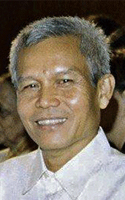What has happened to Sombath, a highly respected civil society worker who dedicated his life to helping the poor in Laos?
Lao officials in the Ministry of Public Security, the Ministry of Foreign Affairs, the National Assembly, and the Prime Minister’s office offer no explanation.

Sombath Somphone
2005 Photo
Kidnappings of those who question the all-powerful political apparatus in Laos are not rare, but this one was captured on tape by a police camera set up to prevent crime in the streets of the capital.
Ng was able to record a viewing of its footage with her cell phone, and this is now on YouTube for all to see.
On the video, Sombath’s jeep is seen stopped in front of a police post at Km4, Thadeua Road. Someone then gets in and drives the jeep away. A white truck approaches, Sombath is led to it, and the truck takes off as the door slams shut.
“Half of me is missing,” Ng told RFA later in an interview. Careful, like her husband, to avoid being described as a “human rights activist,” she nevertheless refuses to give up her pursuit of the truth.
Ng now navigates a difficult path between her determination to bring back her husband and her concern not to offend in a country where no dissent is tolerated.
Though Sombath’s case has been widely reported in the international media, it has received no coverage inside Laos.
“There seems to be a wall of silence that’s fallen inside the country,” Ng said in April 2014, adding that people fear discussing Sombath’s case and that the space for civil society work in Laos has now “narrowed.”
Ng and Sombath met in 1978 at the University of Hawaï. She was working toward her PhD in Sociology, and he—a son of poor Lao farmers in Khammouane Province—was getting a BA in Education and an MA in Agriculture.
A Singaporean, she became a Senior Research Fellow at the Institute of Southeast Asian Studies in Singapore and then worked for UNICEF in Laos, China, and East Timor until 2008.
Sombath opted to return to Laos after the Vietnam War to help in the work of reconstruction. A devout Buddhist, he was known to speak gently but very frankly about the issues affecting the long-term development of this rural country
His initial work included demonstrating low-cost methods of improving farm production and food security. Later, he pioneered the use of participatory rural appraisal techniques in Laos.
Then, in 1996, he was given permission by the Ministry of Education to establish the Participatory Development Training Center, PADETC, to provide training in community-based development for youth and local government officials.
In 2005, he received the Ramon Magsaysay Award—an award often referred to as Asia’s equivalent to the Nobel Prize—for community leadership.
Never one for confrontation, he nevertheless spoke to defend those who did not know how to speak for themselves. Land grabs, inadequate compensation for those displaced by dam construction, health care, and education were some of the causes in which Sombath intervened to try to find just solutions.
“I’ve lost my husband. What can they do to me? I’ve got nothing to lose.”
In 2012, he played a leading role in the organization of a meeting in Laos of the Asia Europe People’s Forum, a civil society grouping that brings together national leaders from across Asia and Europe.
The meeting took place on October 2012. Though 300 participants were expected, 800 people showed up.
The meeting’s success may have worried some in Laos who profit from the country’s unchecked development at the expense of local villagers.
Now left brutally alone after 36 years of a shared life and a common cause, Ng cuts a small figure in her steelrimmed glasses. But she won’t stop asking for her husband’s return.
She now joins the ranks of other women who have seen their husbands—journalists, activists, social workers, and political figures—punished by repressive regimes and who are left to carry on a front-line fight they never trained for
“I’ve lost my husband,” Ng told the U.S. newspaper The Oregonian in an interview. “What can they do to me? I’ve got nothing more to lose.”


 “It's Not OK: Women struggling for human rights” is a series of portraits of Asian women caught in the struggle for human rights in their communities. It was produced by Radio Free Asia. Download the
“It's Not OK: Women struggling for human rights” is a series of portraits of Asian women caught in the struggle for human rights in their communities. It was produced by Radio Free Asia. Download the